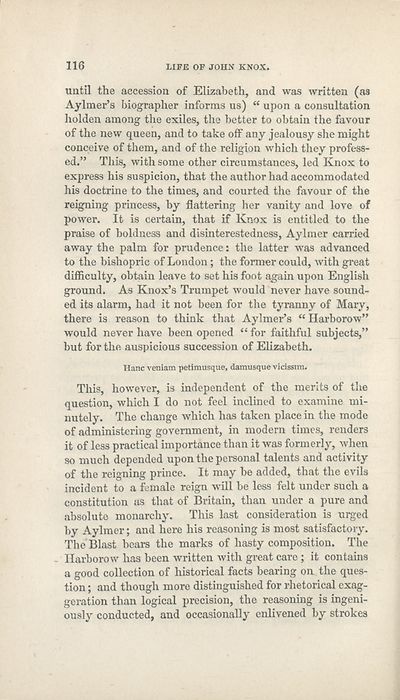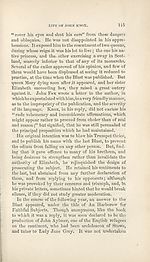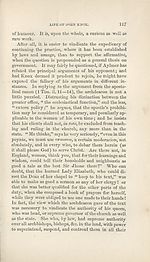Download files
Complete book:
Individual page:
Thumbnail gallery: Grid view | List view

116
LIFE OF JOHN KNOX.
until the accession of Elizabeth, and was written (as
Aylmer’s biographer informs us) “ upon a consultation
holden among the exiles, the better to obtain the favour
of the new queen, and to take off any jealousy she might
conceive of them, and of the religion which they profess¬
ed.” This, with some other circumstances, led Knox to
express his suspicion, that the author had accommodated
his doctrine to the times, and courted the favour of the
reigning princess, by flattering her vanity and love of
power. It is certain, that if Knox is entitled to the
praise of boldness and disinterestedness, Aylmer carried
away the palm for prudence: the latter was advanced
to the bishopric of London; the former could, with great
difficulty, obtain leave to set his foot again upon English
ground. As Knox’s Trumpet would never have sound¬
ed its alarm, had it not been for the tyranny of Mary,
there is reason to think that Aylmer’s “Harborow”
would never have been opened “ for faithful subjects,”
but for the auspicious succession of Elizabeth.
Hanc veniam petimusque, damusque vicissim.
This, however, is independent of the merits of the
question, which I do not feel inclined to examine mi¬
nutely. The change which has taken place in the mode
of administering government, in modern times, renders
it of less practical importance than it was formerly, when
so much depended upon the personal talents and activity
of the reigning prince. It may be added, that the evils
incident to a female reign will be less felt under such a
constitution as that of Britain, than under a pure and
absolute monarchy. This last consideration is urged
by Aylmer; and here his reasoning is most satisfactory.
The'Blast bears the marks of hasty composition. The
Harborow has been written with great care; it contains
a good collection of historical facts bearing on the ques¬
tion ; and though more distinguished for rhetorical exag¬
geration than logical precision, the reasoning is ingeni¬
ously conducted, and occasionally enlivened by strokes
LIFE OF JOHN KNOX.
until the accession of Elizabeth, and was written (as
Aylmer’s biographer informs us) “ upon a consultation
holden among the exiles, the better to obtain the favour
of the new queen, and to take off any jealousy she might
conceive of them, and of the religion which they profess¬
ed.” This, with some other circumstances, led Knox to
express his suspicion, that the author had accommodated
his doctrine to the times, and courted the favour of the
reigning princess, by flattering her vanity and love of
power. It is certain, that if Knox is entitled to the
praise of boldness and disinterestedness, Aylmer carried
away the palm for prudence: the latter was advanced
to the bishopric of London; the former could, with great
difficulty, obtain leave to set his foot again upon English
ground. As Knox’s Trumpet would never have sound¬
ed its alarm, had it not been for the tyranny of Mary,
there is reason to think that Aylmer’s “Harborow”
would never have been opened “ for faithful subjects,”
but for the auspicious succession of Elizabeth.
Hanc veniam petimusque, damusque vicissim.
This, however, is independent of the merits of the
question, which I do not feel inclined to examine mi¬
nutely. The change which has taken place in the mode
of administering government, in modern times, renders
it of less practical importance than it was formerly, when
so much depended upon the personal talents and activity
of the reigning prince. It may be added, that the evils
incident to a female reign will be less felt under such a
constitution as that of Britain, than under a pure and
absolute monarchy. This last consideration is urged
by Aylmer; and here his reasoning is most satisfactory.
The'Blast bears the marks of hasty composition. The
Harborow has been written with great care; it contains
a good collection of historical facts bearing on the ques¬
tion ; and though more distinguished for rhetorical exag¬
geration than logical precision, the reasoning is ingeni¬
ously conducted, and occasionally enlivened by strokes
Set display mode to:
![]() Universal Viewer |
Universal Viewer | ![]() Mirador |
Large image | Transcription
Mirador |
Large image | Transcription
| Antiquarian books of Scotland > Scotland/Scots > Life of John Knox ; and, The life of Alexander Henderson > (134) |
|---|
| Permanent URL | https://digital.nls.uk/131833912 |
|---|
| Description | Thousands of printed books from the Antiquarian Books of Scotland collection which dates from 1641 to the 1980s. The collection consists of 14,800 books which were published in Scotland or have a Scottish connection, e.g. through the author, printer or owner. Subjects covered include sport, education, diseases, adventure, occupations, Jacobites, politics and religion. Among the 29 languages represented are English, Gaelic, Italian, French, Russian and Swedish. |
|---|

